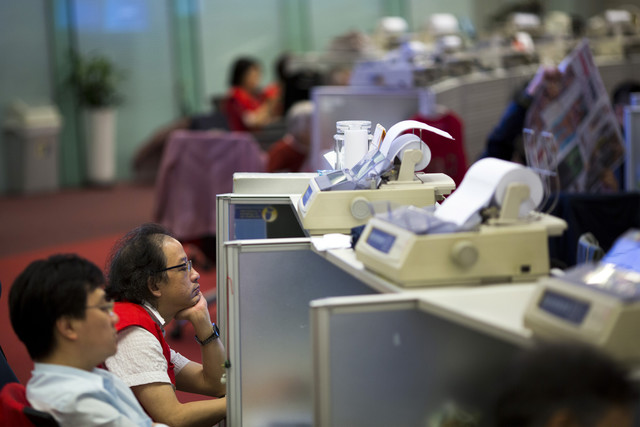Bradley Associates on HK shares to first from worst
Hong Kong Shares Go to First From Worst on China Economy Rebound
Hong Kong stocks are beating every market in Asia as China’s economy strengthens, rebounding from the biggest drop among developed world shares in the first half.
The Hang Seng Index surged 16 percent from its June 24 low, outpacing the 14 percent climb for the Shanghai Composite Index, the next-biggest gain among Asian benchmark gauges in the period, data compiled by Bloomberg show. Even after the rally, Hong Kong’s index traded at 10.9 times estimated earnings as of Sept. 13, the lowest in global developed markets behind Israel.
Chinese economic data that beat forecasts this quarter spurred Hong Kong stocks to reverse course after posting an 8.2 percent loss in the six months through June. New credit almost doubled in August from July, easing concern that a lending crunch would curtail expansion in the world’s second-biggest economy, while equities rallied worldwide on signs growth is picking up.
“A lot of economic data have come in to show China’s not going to have a hard landing,” said Jeffrey Shen, head of emerging markets at BlackRock Inc., the world’s largest asset manager. “Hong Kong is clearly the first place for international investors to put some money to work in China.”
The Hang Seng China Enterprises Index (HSCEI), also known as the H-share index, last week entered a bull market after climbing 20 percent from its June low, and the Hang Seng Index erased this year’s loss. The measure of Chinese shares listed in the city trades at 7.8 times forecast profits, the lowest in Asia.
Relative Value
The MSCI Asia Pacific Index rose 9.6 percent from its June low. Singapore’s Straits Times Index is the only decliner this quarter among 26 developed markets tracked by Bloomberg as investors pulled cash from Southeast Asia before an expected reduction in U.S. Federal Reserve stimulus this week.
Tencent Holdings Ltd. (700) led gains on the Hang Seng Index since June 24. China’s No. 1 Internet company surged 47 percent as the government signaled a renewed push to boost the telecom industry. China Oilfield Services Ltd., an offshore energy contractor, rose 43 percent during the period to lead the H-share gauge higher after its first-half profit beat estimates.
China’s industrial output expanded at the fastest pace in 17 months in August and exports rose more than expected, signs of an economic rebound after a two-quarter slump. Factory production rose 10.4 percent last month while overseas shipments gained 7.2 percent, beating the 5.5 percent estimate of analysts surveyed by Bloomberg.
Less Concern
That data allayed concern that a government crackdown on speculative lending would stifle the economy. The Hang Seng Index lost 16 percent from May 20 through June 24 as money-market rates surged to records.
“At the time, expectations for growth in the second half were declining to an extent that they may ultimately miss the government’s GDP growth target for 2013,” said Stephen Corry, a Hong Kong-based chief investment strategist at LGT Group. “This fear has not materialized.”
Premier Li Keqiang said he was confident of achieving 7.5 percent GDP growth in 2013 as the nation enters a phase of “medium-high” expansion. Bank of America Corp.’s Merrill Lynch unit boosted its growth estimate for China this year to 7.7 percent from 7.6 percent, joining Goldman Sachs Group Inc. and JPMorgan Chase & Co. in raising projections.
Credit Growth
Reports last week showed China’s broadest measure of new credit almost doubled in August from the previous month. Aggregate financing was 1.57 trillion yuan ($257 billion), the People’s Bank of China said, topping the 950 billion yuan median estimate of 10 analysts surveyed by Bloomberg News.
The MSCI Asia Pacific Index traded at 13.3 times estimated earnings on Sept. 13. That compares with multiples of 14.7 for Japan’s Topix (TPX) index and 15.1 for Australia’s S&P/ASX 200 Index, according to data compiled by Bloomberg. The ratio for the Hang Seng China Enterprises Index fell to 6.53 in June, the lowest since the financial crisis in 2008.
Hong Kong shares have also gotten a boost from expectations the Fed will taper stimulus as investors withdraw funds from emerging markets. Economists surveyed by Bloomberg predicted the Fed will cut monthly bond purchases to $75 billion this week. Markets in India, Indonesia and the Philippines declined to hit new 2013 lows last month.
Investors pulled $2.2 billion from Thailand, Indonesia and the Philippines in August, after plowing $6.8 billion into the markets in 2012, data compiled by Bloomberg show.
“Managers are reallocating money from Asean and moving it back to North Asia,” said Corry at LGT Group, which oversees about $117 billion. “The Hang Seng Index is a beneficiary.”
